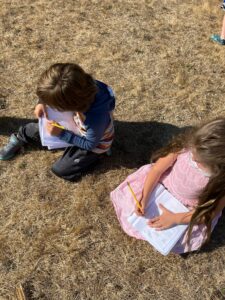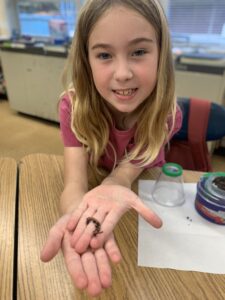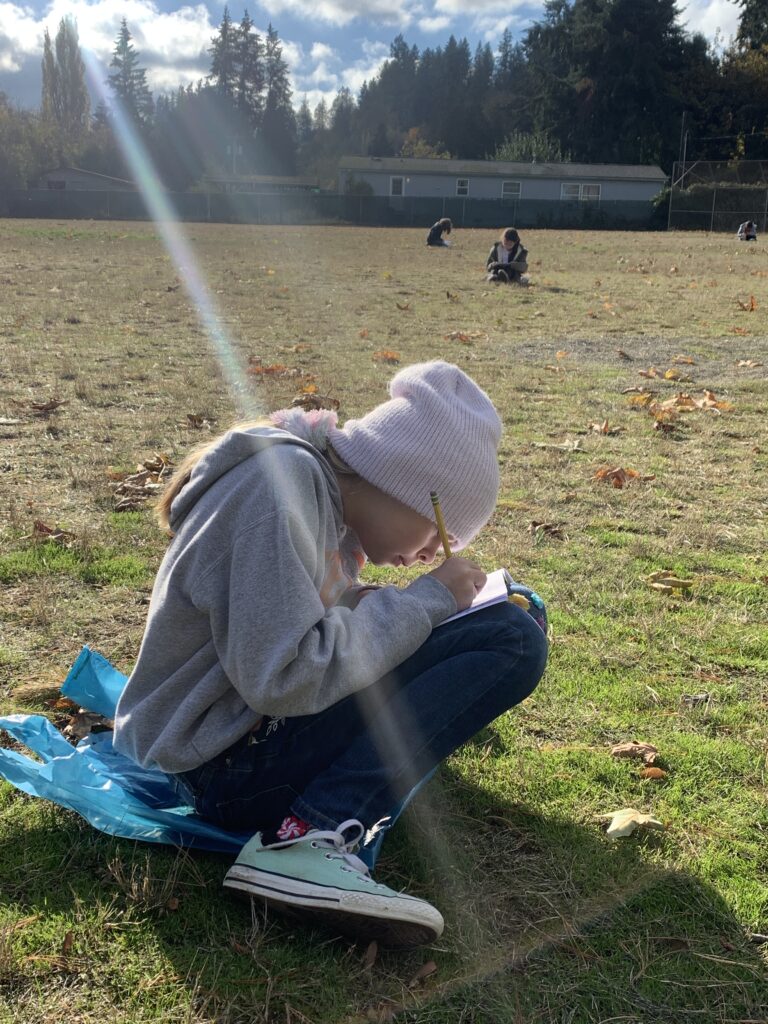Aside from the fact that all three are elementary school teachers, Brittany Moore, Caris Ristoff and Roxann Stewart have two other points in common. All have attended at least one PEI workshop and each benefit from school leadership that supports their outdoor-based learning efforts.

“When you have a good idea and you’re looking at resources and get excited, there’s nothing worse than to feel like you can’t do it,” says Moore, who teaches an integrated block of science, engineering, writing and social studies to all 4th-grade students at Brownsville Elementary School in the Central Kitsap School District. “It’s really nice to have an administrator say, ‘You need to take three hours of release time on this day to work on planning and implementation. Here you go.’ Administrative support is extremely important to the success of outdoor education.”
Stewart, a 5th-grade teacher at the same school, credits Brownsville Elementary Principal Stacey Krumsick with empowering teachers to integrate the outdoors with their curriculum. “She is willing to do a lot of the research and provide resources for us,” Stewart explains. “She never questions if we’re outside and she sees a group or a class just sitting there for five or seven minutes. It feels like we can do more because she’s supporting us.”
“It’s comforting to have an administrator saying that you don’t have to focus on a target skill in an isolated way but instead I’m going to give you, the educator, the flexibility and creativity to find ways to naturally embed those into outdoor experiences. There’s a sense of trust in the process.”
— Caris Ristoff, 1st and 2nd grade teacher, South Whidbey School District
Ristoff teaches first and second graders in South Whidbey School District and enjoys similar support from her administrator. “There’s a general comfort level with understanding that objectives are going to be met through these project-focused alternative measures,” Ristoff notes. “It’s comforting to have an administrator saying that you don’t have to focus on a target skill in an isolated way but instead I’m going to give you, the educator, the flexibility and creativity to find ways to naturally embed those into outdoor experiences. There’s a sense of trust in the process.”
That trust pays off. Stewart, Moore and Ristoff have each noticed higher levels of student engagement and

improved academic performance resulting from outdoor-based learning. Stewart and her class have been creating ‘Toad Abodes,’ potential homes for amphibians that incorporate knowledge about habitat and ecosystems. “They love going outside and the first time we did Toad Abode, they were instantly engaged,” she says. “They’re figuring out how to make the rain cascade off the top and using all these terms from Bear Grylls and other nature shows they’ve seen. They know what those mean and how to use the resources they have.”
In the past year, her class has had the highest science scores in the district, a fact she attributes to a combination of applying PEI training and the outdoor learning the students experience at Camp Coleman. “I was really proud of my kids,” says Stewart. “It’s a result of all the outdoor education. There’s so much material on ecosystems and it’s so easy to visit the marina here at school and find all the different components within the ecosystems.”
For her part, Moore has noted another added benefit of engagement: no student behavior issues. In November during a spell of cold dry days she took the class outdoors for a ‘sit spot’ activity in which they sit quietly in an area and make observations in their science notebook about what they’re experiencing. She warned them that the ground would likely be very cold and provided plastic bags to sit on for any students who didn’t have one. Then they went outdoors.
“It was freezing cold,” says Moore, “and they were into it. They were so excited about sitting outside and just being quiet and still and listening and looking. Engagement is such a natural element of what PEI is trying to do with students. It takes a lot of pressure off the classroom teacher because you can go outside and say, our classroom just got twelve times bigger because we’re out in this field.”
She believes that academic performance automatically improves as a result of engagement. In her class, students of every level of academic ability engage in science notebooks. “They all felt like they had ownership with their learning, and they all wanted to share,” she says. “It’s difficult at times to get students that are achieving below grade level to want to talk to their peers about what they’ve learned. The beauty of going outside is that we all get to see and hear and listen and it’s accessible for all learners.”
Ristoff has noticed that even previously reluctant writers embrace nature journals when they’re outdoors. “There is a natural desire to write,” she notes. “It’s a really tough thing at this grade level to get your students to write complete sentences, but when you naturally embed that into an outdoor environment, they have that desire because they’re using their observational skills. They want to document the things they’re seeing and they’re also getting the movement down.”
PEI provides trainings and ongoing support for teachers but also for schools and entire school districts to help them integrate outdoor-based learning. For any administrators who have never attended a workshop and want to learn more, PEI will be conducting an Introductory Leadership workshop on December 8th. Register here or contact us at [email protected] for more information.
